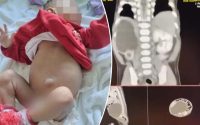My mom has dementia — she’s thrilled to ‘meet’ her grandkids every day
Like any other grandparent, Josie Hunt excitedly gives her grandchildren a loving hug when she sees them.
The sad difference is that the 65-year-old Australian woman suffers from an alcohol-induced form of dementia called Korsakoff syndrome — and thinks she’s meeting the children for the first time each time they visit.
“It’s a bittersweet moment when she sees the kids,” her 35-year-old daughter, Jade Mead, told SWNS.
Mead, a fitness instructor from Perth, said when she takes her children, Marli, 3, and Lottie, 3 months, to see Hunt, she always replies: “Jade, you didn’t tell me you had children.”
Mead added that she doesn’t remember her sister, Hayley Hunt, 41, has a baby either.



Mead believes her mother developed Korsakoff syndrome after drinking alcohol following a gastric sleeve operation in February 2020.
Her condition deteriorated quickly, Mead said, and she was officially diagnosed with the memory disorder in October 2020.
“I believe it stemmed from the gastric sleeve operation,” the mom of two explained.
“Her health started declining from there, [and] she looked so frail,” Mead continued. “She had been drinking alcohol, which we didn’t know about, and you shouldn’t do that.”


Korsakoff syndrome results from vitamin B1 deficiency and is associated with alcoholism.
It damages nerve cells and supporting cells in the brain and spinal cord, as well as the part of the brain involved with memory, according to the National Institute on Alcohol Abuse and Alcoholism.
Mead said she’s been told her mom shouldn’t decline further — at least for a while.
“My 3-year-old doesn’t ask any questions, but I just tell her, ‘Nanny forgets,’” she shared. “She’s always been very loving.”


